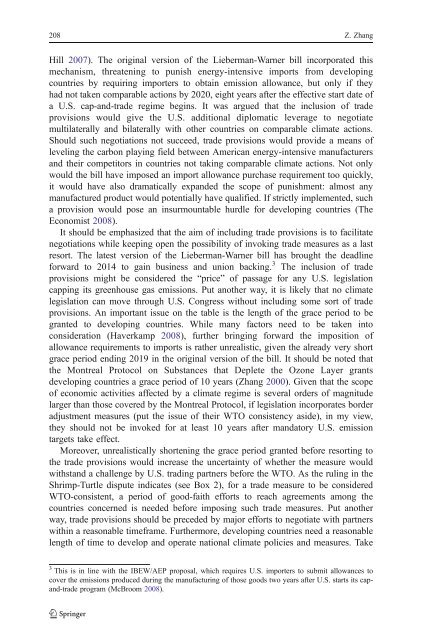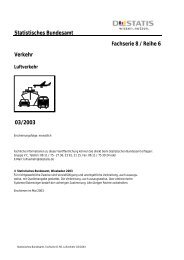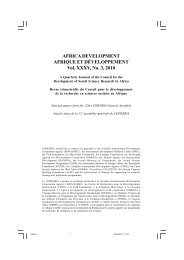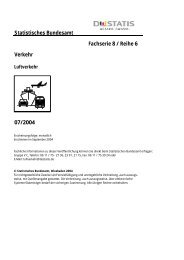The international economics of resources and resource ... - Index of
The international economics of resources and resource ... - Index of
The international economics of resources and resource ... - Index of
Create successful ePaper yourself
Turn your PDF publications into a flip-book with our unique Google optimized e-Paper software.
208 Z. Zhang<br />
Hill 2007). <strong>The</strong> original version <strong>of</strong> the Lieberman-Warner bill incorporated this<br />
mechanism, threatening to punish energy-intensive imports from developing<br />
countries by requiring importers to obtain emission allowance, but only if they<br />
had not taken comparable actions by 2020, eight years after the effective start date <strong>of</strong><br />
a U.S. cap-<strong>and</strong>-trade regime begins. It was argued that the inclusion <strong>of</strong> trade<br />
provisions would give the U.S. additional diplomatic leverage to negotiate<br />
multilaterally <strong>and</strong> bilaterally with other countries on comparable climate actions.<br />
Should such negotiations not succeed, trade provisions would provide a means <strong>of</strong><br />
leveling the carbon playing field between American energy-intensive manufacturers<br />
<strong>and</strong> their competitors in countries not taking comparable climate actions. Not only<br />
would the bill have imposed an import allowance purchase requirement too quickly,<br />
it would have also dramatically exp<strong>and</strong>ed the scope <strong>of</strong> punishment: almost any<br />
manufactured product would potentially have qualified. If strictly implemented, such<br />
a provision would pose an insurmountable hurdle for developing countries (<strong>The</strong><br />
Economist 2008).<br />
It should be emphasized that the aim <strong>of</strong> including trade provisions is to facilitate<br />
negotiations while keeping open the possibility <strong>of</strong> invoking trade measures as a last<br />
resort. <strong>The</strong> latest version <strong>of</strong> the Lieberman-Warner bill has brought the deadline<br />
forward to 2014 to gain business <strong>and</strong> union backing. 3 <strong>The</strong> inclusion <strong>of</strong> trade<br />
provisions might be considered the “price” <strong>of</strong> passage for any U.S. legislation<br />
capping its greenhouse gas emissions. Put another way, it is likely that no climate<br />
legislation can move through U.S. Congress without including some sort <strong>of</strong> trade<br />
provisions. An important issue on the table is the length <strong>of</strong> the grace period to be<br />
granted to developing countries. While many factors need to be taken into<br />
consideration (Haverkamp 2008), further bringing forward the imposition <strong>of</strong><br />
allowance requirements to imports is rather unrealistic, given the already very short<br />
grace period ending 2019 in the original version <strong>of</strong> the bill. It should be noted that<br />
the Montreal Protocol on Substances that Deplete the Ozone Layer grants<br />
developing countries a grace period <strong>of</strong> 10 years (Zhang 2000). Given that the scope<br />
<strong>of</strong> economic activities affected by a climate regime is several orders <strong>of</strong> magnitude<br />
larger than those covered by the Montreal Protocol, if legislation incorporates border<br />
adjustment measures (put the issue <strong>of</strong> their WTO consistency aside), in my view,<br />
they should not be invoked for at least 10 years after m<strong>and</strong>atory U.S. emission<br />
targets take effect.<br />
Moreover, unrealistically shortening the grace period granted before resorting to<br />
the trade provisions would increase the uncertainty <strong>of</strong> whether the measure would<br />
withst<strong>and</strong> a challenge by U.S. trading partners before the WTO. As the ruling in the<br />
Shrimp-Turtle dispute indicates (see Box 2), for a trade measure to be considered<br />
WTO-consistent, a period <strong>of</strong> good-faith efforts to reach agreements among the<br />
countries concerned is needed before imposing such trade measures. Put another<br />
way, trade provisions should be preceded by major efforts to negotiate with partners<br />
within a reasonable timeframe. Furthermore, developing countries need a reasonable<br />
length <strong>of</strong> time to develop <strong>and</strong> operate national climate policies <strong>and</strong> measures. Take<br />
3 This is in line with the IBEW/AEP proposal, which requires U.S. importers to submit allowances to<br />
cover the emissions produced during the manufacturing <strong>of</strong> those goods two years after U.S. starts its cap<strong>and</strong>-trade<br />
program (McBroom 2008).








